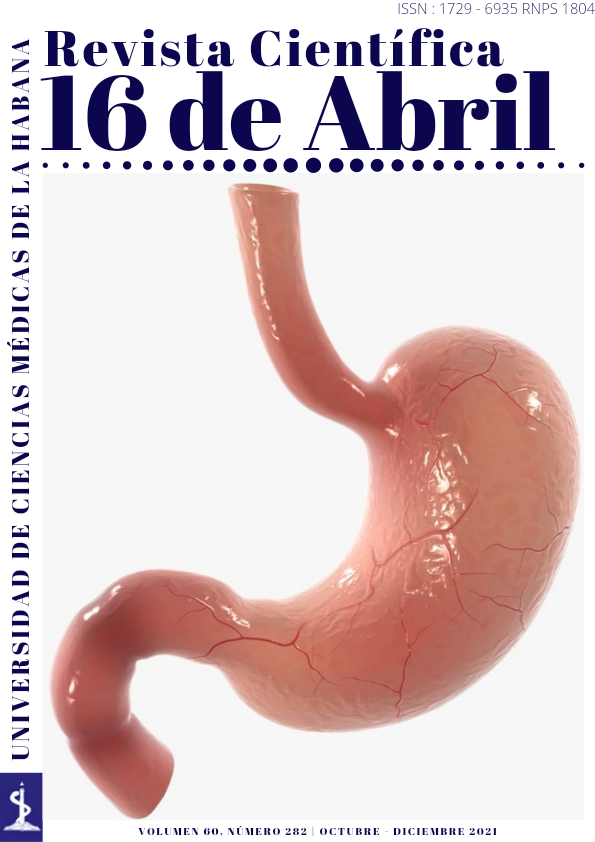Influencia de la genética y la genómica en el tratamiento con antihipertensivos diuréticos
Palabras clave:
Antihipertensivos, Diuréticos, Farmacogenética, Genes, efectos Adversos.Resumen
Introducción: la hipertensión arterial es considerada un problema de salud a nivel mundial. Varios estudios farmacológicos reportan efectos adversos asociados a la influencia del componente genético y genómico en los antihipertensivos basados en la utilización de los principios de la farmacogenética y farmacogenómica.
Objetivo: describir la influencia del componente genético y genómico en el tratamiento con antihipertensivos diuréticos. Método: se realizó una revisión bibliográfica en el periodo de abril a mayo de 2021. Se utilizaron los recursos disponibles en PubMed/MEDLINE y SciELO. De 32 referencias encontradas mediante los descriptores en ciencias de la salud, se consultaron 29 referencias bibliográficas que cumplieron los criterios de selección.
Desarrollo: las variantes genéticas que perjudican las interacciones fármaco-receptor o las señales intracelulares posteriores pueden cambiar la farmacodinamia y la eficacia del fármaco. Los efectos de los diuréticos se realizan a través de diferentes mecanismos, se han sugerido varios genes candidatos para influir en las respuestas individuales a estos fármacos. Se han observado mejoras en la presión arterial en respuesta al tratamiento con hidroclorotiazida en los portadores del genotipo GC en comparación con los portadores del genotipo CC.
Conclusiones: los polimorfismos genéticos influyen en la respuesta de los antihipertensivos diuréticos, ya que intervienen en la sensibilidad a la sal y las concentraciones plasmáticas de renina. Se evidencian mejores respuestas antihipertensivas en individuos portadores de los genotipos AA+AG en comparación con los portadores de GG.
Citas
Tsioufis C, Thomopoulos C. Combination drug treatment in hypertension. Pharmacol Res [Internet]. 2017 [citado 07/04/21]; 125(3):266-271.Disponible en: https://doi:10.1016/j.phrs.2017.09.011
Peacock E, Krousel-Wood M. Adherence to Antihypertensive Therapy. Med Clin North Am [Internet]. 2017 [citado 07/04/21]; 101(1):229-245. Disponible en: https://doi:10.1016/j.mcna.2016.08.005
Chang TI. Impact of drugs on intradialytic hypotension: Antihypertensives and vasoconstrictors. Semin Dial [Internet]. 2017 [citado 07/04/21]; 30(6):532-536. Disponible en: https://doi:10.1111/sdi.12633
Ormond KE, Mortlock DP, Scholes DT, Bombard Y, Brody LC, Faucett WA, et al. Human Germline Genome Editing. Am J Hum Genet [Internet]. 2017 [citado 07/04/21]; 101(2):167-176. Disponible en: https://doi:10.1016/j.ajhg.2017.06.012
Sychev DA, Shih NV, Kalle EG, Ryzhikova KA, Morozova TE. Farmakogeneticheskiepodkhody v prognozirovaniiéffektivnosti i bezopasnostiamlodipina u bol'nykharterial'noĭgipertenzieĭ [Pharmacogenetic approaches to predicting the efficiency and safety of amlodipine in patients with arterial hypertension]. Biomed Khim Russian [Internet]. 2017 [citado 07/04/21];63(5):432-439. Disponible en: https://doi:10.18097/PBMC20176305432
Kelley EF, Olson TP, Curry TB, Sprissler R, Snyder EM. The Effect of Genetically Guided Mathematical Prediction and the Blood Pressure Response to Pharmacotherapy in Hypertension Patients. Clin Med Insights Cardiol [Internet]. 2019 [citado 07/04/21]; 13:1179546819845883. Disponible en: https://doi:10.1177/1179546819845883
Oparil S, Acelajado MC, Bakris GL, Berlowitz DR, Cífková R, Dominiczak AF, et al. Hypertension. Nat Rev Dis Primers [Internet]. 2018 [citado 07/04/21]; 4:18014. Disponible en: https://doi:10.1038/nrdp.2018.14
Eadon MT, Kanuri SH; Chapman AB.Pharmacogenomic studies of hypertension: paving the way for personalized antihypertensive treatment. Expert Rev Precis Med Drug Dev [Internet]. 2018 [citado 07/04/21]; 3(1):33-47. Disponible en: https://doi.org/10.1080/23808993.2018.1420419
Roush GC, Sica DA. Diuretics for Hypertension: A Review and Update. Am J Hypertens [Internet]. 2016 [citado 07/04/21]; 29(10):1130-7. Disponible en: https://doi:10.1093/ajh/hpw030
Singh S, McDonoughCW, Gong Y,AlghamdiWA,Arwood MJ, BargalSA, et al. Genome wide association study identifies the HMGCS2 Locus to be Associated WithChlorthalidone Induced Glucose Increase in Hypertensive Patients. J Am Heart Assoc [Internet]. 2018 [citado 07/04/21]; 7(6) e007339. Disponible en:http://doi.org/10.1161/JAHA.117.007339
Carey RM, Muntner P, Bosworth HB, Whelton PK. Prevention and Control of Hypertension: JACC Health Promotion Series. J Am Coll Cardiol [Internet]. 2018 [citado 07/04/21]; 72(11):1278-1293. Disponible en: https://doi:10.1016/j.jacc.2018.07.008 4
Eadon MT, Kanuri SH, Chapman AB. Pharmacogenomic studies of hypertension: paving the way for personalized antihypertensive treatment. Expert Rev Precis Med Drug Dev [Internet]. 2018 [citado 07/04/21]; 3(1):33-47. Disponible en: https://doi:10.1080/23808993.2018.1420419
Surendran P, Drenos F, Young R, Warren H, Cook JP, Manning AK. Trans-ancestry meta-analyses identify rare and common variants associated with blood pressure and hypertension. NatGenet [Internet]. 2016 [citado 07/04/21]; 48(10):1151-1161. Disponible en: https://doi:10.1038/ng.3654
Petrie JR, Guzik TJ, Touyz RM. Diabetes, Hypertension, and Cardiovascular Disease: Clinical Insights and Vascular Mechanisms. Can J Cardiol [Internet]. 2018 [citado 07/04/21];34(5):575-584. Disponible en:https://doi:10.1016/j.cjca.2017.12.005
Morrell NW, Aldred MA, Chung WK, Elliott CG, Nichols WC, Soubrier F, et al. Genetics and genomics of pulmonary arterial hypertension. Eur Respir J [Internet]. 2019 [citado 07/04/21]; 53(1):1801899. Disponible en: https://doi:10.1183/13993003.01899-2018
Manosroi W, Williams GH. Genetics of Human Primary Hypertension: Focus on Hormonal Mechanisms. Endocr Rev [Internet]. 2019 [citado 07/04/21]; 40(3):825-856. Disponible en: https://doi:10.1210/er.2018-00071
Louca P, Menni C, Padmanabhan S. Genomic Determinants of Hypertension With a Focus on Metabolomics and the Gut Microbiome. Am J Hypertens [Internet]. 2020 [citado 07/04/21];33(6):473-481. Disponible en: https://doi:10.1093/ajh/hpaa022
Williams RB, Bishop GD, Haberstick BC, Smolen A, Brummett BH, Siegler IC, et al. Population differences in associations of serotonin transporter promoter polymorphism (5HTTLPR) di- and triallelic genotypes with blood pressure and hypertension prevalence. Am Heart J [Internet]. 2017 [citado 07/04/21]; 185:110-122. Disponible en: https://doi.org/10.1016/j.ahj.2016.12.013
Magvanjav O, Gong Y, McDonough CW, Chapman AB, Turner ST, Gums JG,et al. Genetic variants associated with uncontrolled blood pressure on thiazide diuretic/beta-blocker combination therapy in the PEAR (Pharmacogenomic Evaluation of Antihypertensive Responses) and INVEST (International Verapamil-SR Trandolapril Study) Trials. J Am Heart Assoc [Internet]. 2017 [citado07/04/21]; 6(11):e006522. Disponible en: http://dx.doi.org/10.1161/JAHA.117.006522
Ferdinand KC, Yadav K, Nasser SA, Clayton-Jeter HD, Lewin J, Cryer DR, et al.Disparities in hypertension and cardiovascular disease in blacks: The critical role of medication adherence. J Clin Hypertens (Greenwich) [Internet]. 2017 [citado 07/04/21];19(10):1015-1024. Disponible en: https://doi:10.1111/jch.13089
Sá ACC, Webb A, Gong Y, McDonough CW, Shahin MH, Datta S, et al. Blood pressure signature genes and blood pressure response to thiazide diuretics: results from the PEAR and PEAR-2 studies. BMC Med Genomics [Internet]. 2018 [citado 07/04/21];11(1):55. Disponible en: https://doi:10.1186/s12920-018-0370-x
Tu YA, Lin SJ, Chen PL, Chou CH, Huang CC, Ho HN, et al. HSD3B1 gene polymorphism and female pattern hair loss in women with polycystic ovary syndrome. J Formos Med Assoc [Internet]. 2019 [citado 07/04/21];118(8):1225-1231. Disponible en:https://doi:10.1016/j.jfma.2019.04.013
Christian C, Borden BA, Danahey K, Yeo KJ, van Wijk XMR, Ratain MJ, et al. Pharmacogenomic-Based DecisionSupport to Predict Adherence to Medications. Clin PharmacolTher [Internet]. 2020 [citado 07/04/21];108(2):368-376. Disponible en: https://doi:10.1002/cpt.1838
Ma H, He Y, Bai M, Zhu L, He X, Wang L, et al. The genetic polymorphisms of ZC3HC1 and SMARCA4 are associated with hypertension risk. Mol Genet Genomic Med [Internet]. 2019 [citado 07/04/21];7(11):e942. Disponible en: https://doi:10.1002/mgg3.942
Carey RM, Calhoun DA, Bakris GL, Brook RD, Daugherty SL, Dennison-Himmelfarb CR, et al.Resistant Hypertension: Detection, Evaluation, and Management: A Scientific Statement From the American Heart Association. Hypertension [Internet]. 2018 [citado 07/04/21];72(5):e53-e90. Disponible en: https://doi:10.1161/HYP.0000000000000084
Loganathan L, Gopinath K, Sankaranarayanan VM, Kukreti R, Rajendran K, Lee JK, et al. Computational and Pharmacogenomic Insights on Hypertension Treatment: Rational Drug Design and Optimization Strategies. Curr Drug Targets [Internet]. 2020 [citado 07/04/21];21(1):18-33.Disponible en: https://doi:10.2174/1389450120666190808101356
Oliveira-Paula GH, Pereira SC, Tanus-Santos JE, Lacchini R. Pharmacogenomics And Hypertension: Current Insights. Pharmgenomics Pers Med [Internet]. 2019 [citado 07/04/21];12:341-359. Disponible en:https://doi:10.2147/PGPM.S230201
Padmanabhan S, Dominiczak AF. Genomics of hypertension: the road to precision medicine. Nat Rev Cardiol [Internet]. 2021 [citado 07/04/21]; 18(4):235-250. Disponible en: https://doi:10.1038/s41569-020-00466-4
Descargas
Publicado
Cómo citar
Número
Sección
Licencia
Aquellos autores/as que tengan publicaciones con esta revista, aceptan los términos siguientes:
Los autores/as conservarán sus derechos de autor y garantizarán a la revista el derecho de primera publicación de su obra, el cuál estará bajo una Licencia de Creative Commons Reconocimiento-NoComercial 4.0 Internacional (CC BY-NC 4.0)
Los autores/as podrán adoptar otros acuerdos de licencia no exclusiva de distribución de la versión de la obra publicada (p. ej.: depositarla en un archivo telemático institucional o servidores preprint) siempre que se indique la publicación inicial en esta revista.
Se permite y recomienda a los autores/as difundir su obra a través de Internet (p. ej.: en archivos telemáticos institucionales o en su página web) antes y durante el proceso de envío, lo cual puede producir intercambios interesantes y aumentar las citas de la obra publicada.








